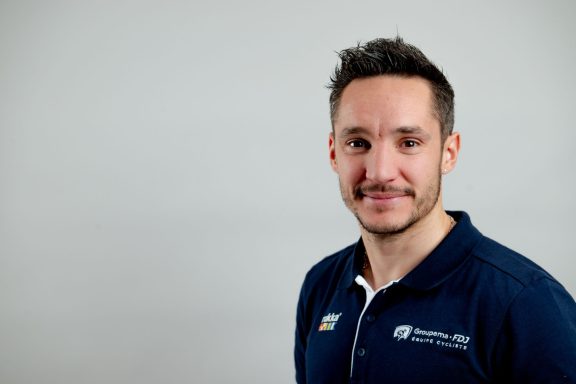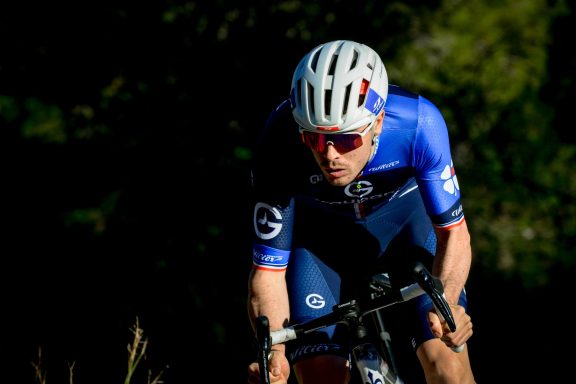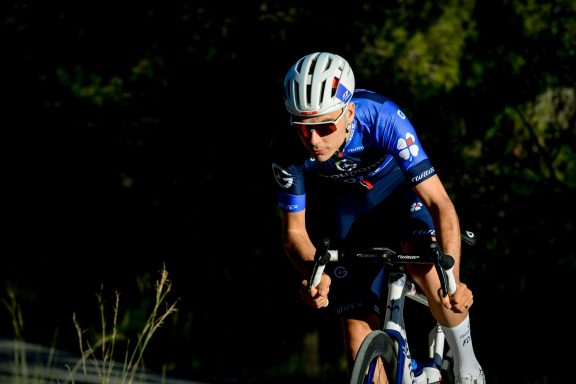Second youngest rider in the Groupama-FDJ continental team for 2020, Hugo Page also is the first Frenchman we “get to know” in this section. A junior time trial national champion last season, the 18-year-old has made a name for himself on the national scene since the U17 categories, when he got to win… the Madiot Trophy. Which is not a pure coincidence. While looking forward to continue his learning, he traces his journey until today.
When Hugo Page is born, football is on a high in France, just a year after the Euro 2000 victory and three after the World Cup win. Meanwhile, cycling struggles to pick itself up again and to gain credibility. Like many children of his generation, it is therefore through football that he gets into sports a few years later. “But I was not very good; not good at all actually,” he smiles. At nine, he leaves the pitch and jumps on a road bike under the leadership of his father, a former amateur rider. “We went on a ride together, with my grandfather, and I just kept going since then.” The young boy from Chartres joins a club right after and his hunger for competition grows quickly. “From the start, I wanted to race with my father in training. And from my first races, I wanted to try to win.”
The U15 “Cannibal”, looking to the Madiot Trophy in U17
He conducts his first years of practice with this same state of mind and already some discipline in training. This leads him to over-dominate the regional competitions during his second year as U15. At 14, he wins 30 out of the 31 races in which he takes part. “I think I already had qualities. I wasn’t necessarily training a lot, just enough for my age category”, he says. “I think I was already quite developed physically for my age, it could benefit me. And then, once you win 4-5 races, you also have a psychological advantage over the others at the start”. As spectacular as they might be, such statistics cannot guarantee a future in cycling, particularly in such an early age. However, they certainly provide an extra-motivation. “Already at that time, some people were telling me about a future in cycling, but with my family, we were just happy that it was going well. I wasn’t really looking into the future, I was just enjoying the moment and I was just looking forward to the next weekend; I just wanted to race all the time”, says Hugo.
Instead of making ambitious plans, the young boy soberly enjoys his passion; the wins obviously helping to do so. Nevertheless, he’s well aware of his potential. So is his family, which “completely” supports him and certainly takes pleasure but also time to accompany him everywhere. This gets even truer when he enters the U17; “A whole different story,” he confesses. He then must frequently leave his territory in order to meet a more national, stronger adversity. The Madiot Trophy appears to be the perfect platform. “I wanted to participate in the biggest events in France for U17. And the biggest event is the Madiot Trophy”, he assures. “In my first year, I took part in a few rounds to gain experience and make some results, but in my second year, that was my main goal of the season. It was even more important to me because when you think about Madiot, you think about Groupama-FDJ (FDJ at the time, note), and it was already my favourite team back then”. In 2016 – his “warm-up” season -, he already gets four top 10 and finishes tenth overall. More conquering and stronger the following year, he wins the two competition’s time trials and nets two more top 10 before entering the eighth and final round in the leading position.
Yvon’s words and confirming his potential
In the streets of Laval, however, he decides to apply the “attack is the best form of defence” motto, taking himself the initiative instead of letting the others doing so. He finishes second in the race and not only receives the overall trophy but also praises from a very special spectator. “After my final victory, Yvon [Madiot] made comments that left their mark on me”, he recalls. “He was satisfied with my attitude. He said that I had raced like a leader, that I deserved this victory and that he hoped to see me again soon and higher. Honestly, I think that’s what made me want to do things even more seriously, to continue doing everything in order to join his team one day. It was very motivating at the time, but even today, I sometimes watch the video and it still motivates me”. This Madiot Trophy success also serves as a turning point. “I start to think I can maybe do something in cycling,” says Hugo, who’s 16 at the time. “Especially since I had also done some physical tests at the hospital, and they were good. All this enabled me to join the BTWIN U19 club, which was still supported by FDJ when I signed with them. At that point, I realized that it was starting to be serious.”
In training, he had always been serious. “I would not skip one, also because I liked it,” he explains. However, the new step that represents the access to the junior category logically leads him to make some changes in his daily life. “It was the time when I started to pay much more attention to nutrition, recovery and everything else. Before that, I mostly had fun. But then, it was necessary to get more serious”. While pursuing his studies to ensure that he graduates high school, Hugo Page gets more professional entering this new career’s chapter. Still, he admits racing “any old how”, “like a U17”, in his first junior race. However, he then goes on to win three UCI events in the following weeks: La Bernaudeau, the Tour des Portes du Pays d’Othe as well as a stage of the Tour du Pays de Vaud. “It immediately put me in the right momentum,” he says. “I realized that even if I just came from the U17, I could have the level required and hope for great things in the juniors, including internationally”. On the national scene, he gets close to a medal on the French time trial championship. At the end of the season, he finishes tenth in the Chrono des Nations mastered by a certain Remco Evenepoel.
2019: Domination and hesitation
He thus concludes a very good first season among the juniors and heads towards 2019 with consequent ambitions. “I wanted to do at least as good, meaning winning internationally. I must say that I put a little pressure on myself, because of that, but also because I wanted to join the Groupama-FDJ Continental team”, he explains. “Internationally, it forced me into error, I was not able to win and it was a bit annoying. I was too wait-and-see, I was kind of afraid to attack. In Juniors 1, I wasn’t thinking about it. When I wanted to attack, I would do it. In Juniors 2, I was more in the reflection, wondering if I could make it this way, if it was better to wait, etc … Perhaps I also had lost the aggressive style of racing a bit, because usually, in France, I mostly had to control the races. Nationally, I was satisfied with myself. I succeeded in winning time trials and I then had to handle the online stages to win the GC. It was also a good experience”. Even though he was not as productive as he hoped for in the UCI events – 5 top 10 and a podium anyway -, he made up for it on the French calendar with no less than 14 victories; eight time trials, four general classifications, one Classic… and the French time trial championship as the high point.
“Honestly, I never felt so much pressure,” he perfectly remembers. “You may have won all the previous time trials, this is the one you have to win to get the jersey. I was so stressed that I didn’t have good legs. On the course, I wasn’t even thinking about my effort as I usually do, I was just thinking about the result”. In the end, he did meet the expectations inherent to his status and pulled the champion’s jersey on. He showed this jersey off in the best possible way by winning the Chrono des Nations of his category as a conclusion to his season. “It was a great moment to finish my junior years,” he said. “In addition to that, we had just made some adjustments with the Groupama-FDJ team, who I had just signed with. I have one arm slightly larger than the other, one leg larger than the other, and that puts me at a bit of a disadvantage. We made a few changes to my shoes and the handlebars, and it paid off. I was looking forward to race against the clock again this year…” Due to the Covid-19 pandemic and the resulting cycling break, he won’t be able to put his discipline’s interest into practice for a while. But Hugo Page would rather clarify: despite his background and record, he is not, and does not necessarily want to be, “just” a time trialist.
“I was categorized as a time trial specialist but…”
“I don’t know if I headed towards time trial on my own or if I was pushed a bit in that direction given my abilities,” he explains. “I didn’t necessarily choose it, actually. I think time trial came naturally to me after the various tests that I was able to perform, when we saw that I was able to ride fast enough for a long time. Professional teams also loaned me TT bikes during my junior years, and that obviously encouraged me to train a little more in this area in order to achieve good results”. The results were not lacking, but his time trial aptitudes are not just physical. “I don’t necessarily need someone next to me to be able to go flat-out,” he says. “I can do it alone. This may also be why I like this discipline”. Direct confrontation might not be always fundamental to him but he still misses it at times. This particularly happened at the end of last season. Although he was more motivated to ride the Yorkshire Worlds’ road race than the time trial, his status and profile got the better of his wishes. This is also why, the young man is now simply trying to get out of a box in which some have unconsciously locked him up: “I probably don’t know myself well enough to know if I really am a pure time trialist. I was categorized as a time trial specialist, but I also hope to perform well on road races”.
In that perspective, he’s already got some ideas, especially thanks to his “good or bad” international experiences in the junior ranks. “I have a good sprint (La Bernaudeau, Tour du Pays de Vaud, note), but not good enough to be among the very best sprinters. I climb well, but I am not among the best climbers either. However, I really like efforts from 30 seconds up to 5 minutes, as much as the time trial to tell the truth. I think gruelling races, for punchers, quite difficult but without long climbs, where it’s more about explosiveness, can suit me well”, he describes. At the highest level, he obviously mentions the Ardennes Classics, like Liège-Bastogne-Liège, but also the Flemish ones with their bergs. Nor does he close the door to some week-long stage races that include time trials. “The Grands Tours and the Tour in particular are the dream as well,” he goes on, “but I think that I will come up short, physically speaking, in the mountains. And well, I’ll have to make choices”. This is the whole purpose of the Groupama-FDJ development team, which he joined this year after having been in regular contacts last year. “It was the obvious choice”, he insists, recalling having become an unconditional fan of the team and Thibaut Pinot a day of July 2012, when he barely was 10 years old.
“We have no excuse, we don’t miss anything”
Unlike some of his current teammates, Hugo Page therefore arrived in the “Conti” in his first U23 year, which will give him even more time to develop. “This team is ideal for getting to know yourself,” he says. “We are still young and we don’t have enough experience to decide what kind of rider we’ll be. I don’t think anyone knows himself completely at 18. We shouldn’t set boundaries and must try everything. This is precisely what we have the opportunity to do here considering the race schedule. Also, given the infrastructures, equipment, staff, I think that this is just as good as a WorldTeam. We have everything to perform well, we have no excuse, and we don’t miss anything.” In Besançon, where the Conti headquarters are located, he has the opportunity to become “independent” and “to fly the nest”. He shares a flat with his friend Paul Penhoët, whom he likes “to beat at Fortnite or Fifa”, he smiles, but he also finds a perfect playground for training. “There are all types of terrain, apart from 20-kilometer climbs”. He now just looks forward to get all of this back: “During the training camps, we felt that there was already a real team spirit, a good momentum and a good cohesion, even though we still hadn’t found ourselves all together in Besançon,” he concludes. “We were starting to build a nice thing together and we got a bit stopped in our tracks, but it’s the same for everyone. Anyway, from a personal point of view, I felt that all of us were already willing to make sacrifices for one another. All this when we had shared only a few moments, and only one race as far as I’m concerned, together”.




No comment